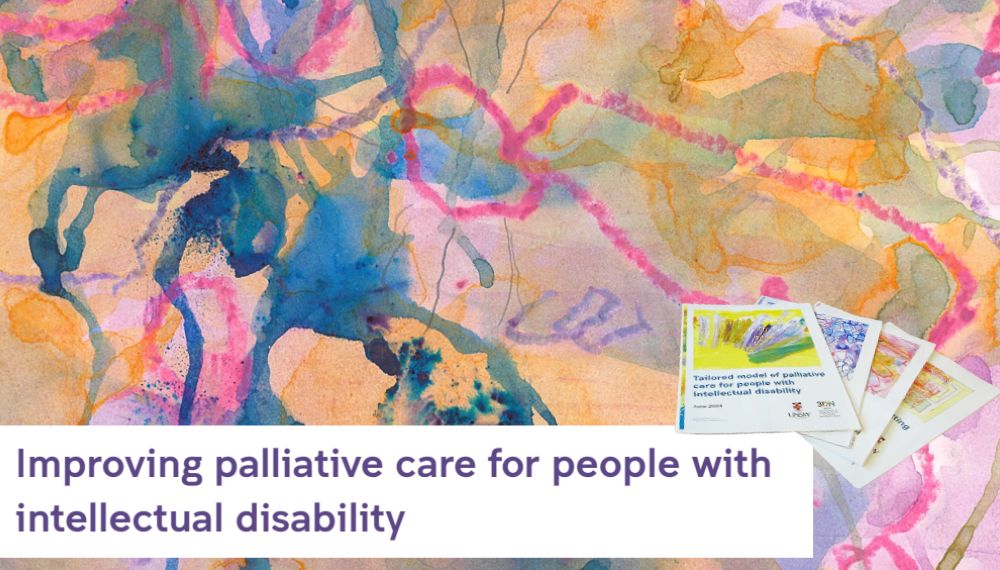
Improving Palliative Care for People with Intellectual Disability
- by Maria Lopez
- May 2, 2025
Ensuring access to quality palliative care for everyone means paying close attention to the people too often left out of the picture. For Australians with intellectual disability, a life-limiting illness can bring not just grief but also confusion, distress, and inadequate care, often because services are not designed with their needs in mind. A nationally funded project led by UNSW’s Department of Developmental Disability Neuropsychiatry (3DN), in partnership with the National Centre of Excellence in Intellectual Disability Health (NCEIDH), aims to change that.
With input from people with intellectual disability, families, carers, clinicians and advocates, the Improving Palliative Care Services for People with Intellectual Disability project has developed a Tailored Model of Palliative Care, a flexible, inclusive framework that helps guide how palliative care services can better support people with intellectual disability. Launched in 2024 alongside two practical toolkits, these resources are already helping professionals and services shift toward more equitable, person-centred care.
The model itself is built around two key ideas. First, that all providers, generalist and specialist alike, need support and training to deliver care that responds to the unique needs of people with intellectual disability. Second, that true person-centred care requires strong collaboration between palliative care services, disability support providers, families, and carers. This isn’t about creating a new service silo, it’s about making existing services work better, together.
A major strength of the model lies in the practical considerations it outlines for implementation. Communication is a cornerstone: recognising the need to adapt communication methods so people with intellectual disability can fully participate in decisions about their care. Consent and decision-making are approached as shared, supported processes, not administrative hurdles. The model also highlights the need for appropriate tools and approaches to assess and manage symptoms, coordinate care across sectors, and provide tailored grief and bereavement support that doesn’t exclude people with disability from these critical aspects of palliative care.
The model also calls for improvements in national data collection on the palliative care experiences of people with intellectual disability. Without accurate and inclusive data, it remains difficult to identify service gaps, track outcomes, or design responsive policies. Embedding disability identifiers in national health datasets is a key recommendation, helping ensure that people with intellectual disability are visible in the system, and that services are held accountable for delivering equitable care.
Alongside the model, the team developed two complementary toolkits. One is designed for health professionals, offering practical guidance on communication, planning, symptom assessment, and working collaboratively with disability services and families. The other, available in both Plain English and Easy Read formats, speaks directly to people with intellectual disability and their supporters, helping them understand what palliative care is, what choices they have, and how they can be involved in decisions.
These resources make an important contribution to reducing health inequality and improving accessibility in palliative care. But they also issue a quiet challenge to all of us working in health and community care: to recognise that inclusion isn’t optional. Accessible, person-centred care at the end of life should be the standard, not the exception. These new resources give services and professionals the tools to start closing that gap.
You can explore the full suite of project resources here:
Written by Sarah Whiteley
Artwork by Matthew Elliott. Seagulls at Manly 2017
Upcoming Events
- FEBRUARY 25, 2026
- 10:30 AM - 12:00 PM
Being Present in the ‘In-Between’: Understanding Living Grief
Palliative care is not only for end-of-life; it frequently involves support...
Read more- MARCH 3, 2026
- 10:00 AM - 12:00 PM
NSW Network of Managers of Palliative Care Volunteers – March meeting
The role of the Network is to ensure best practice for Managers of palliati...
Read more- APRIL 14, 2026
- 9:30 AM - 3:30 PM
Palliative Care Volunteer Biography Service Training
Palliative Care Volunteer Biography Service Training Are you looking to exp...
Read moreBecome a member of Palliative Care NSW
Palliative Care New South Wales is the peak body in NSW representing palliative care providers and those with an interest in palliative care. Palliative Care New South Wales is a member of the national peak body Palliative Care Australia.
Join today and receive discounts, benefits and more!
Special member rate available for volunteers.
Subscribe to our eNews
Be the first to know our latest new, events, and research!
SUBSCRIBE TO ENEWS





